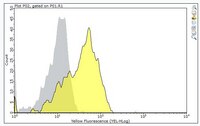MABF2091-100UG Sigma-AldrichAnti-CD6 Antibody, clone 34-3
Anti-CD6, clone 34-3, Cat. No. MABF2091, is a rat monoclonal antibody that detecs T-cell differentiation antigen CD6 and has been tested for use in Flow Cytometry.
More>> Anti-CD6, clone 34-3, Cat. No. MABF2091, is a rat monoclonal antibody that detecs T-cell differentiation antigen CD6 and has been tested for use in Flow Cytometry. Less<<Recommended Products
Overview
| Replacement Information |
|---|
Key Spec Table
| Species Reactivity | Key Applications | Host | Format | Antibody Type |
|---|---|---|---|---|
| M | FC | R | Purified | Monoclonal Antibody |
| References |
|---|
| Product Information | |
|---|---|
| Format | Purified |
| Presentation | Purified rat monoclonal antibody IgG2b in buffer containing 0.1 M Tris-Glycine (pH 7.4), 150 mM NaCl with 0.05% sodium azide. |
| Quality Level | MQ100 |
| Physicochemical Information |
|---|
| Dimensions |
|---|
| Materials Information |
|---|
| Toxicological Information |
|---|
| Safety Information according to GHS |
|---|
| Safety Information |
|---|
| Storage and Shipping Information | |
|---|---|
| Storage Conditions | Stable for 1 year at 2-8°C from date of receipt. |
| Packaging Information | |
|---|---|
| Material Size | 100 μg |
| Transport Information |
|---|
| Supplemental Information |
|---|
| Specifications |
|---|
| Global Trade Item Number | |
|---|---|
| Catalogue Number | GTIN |
| MABF2091-100UG | 04054839441189 |







